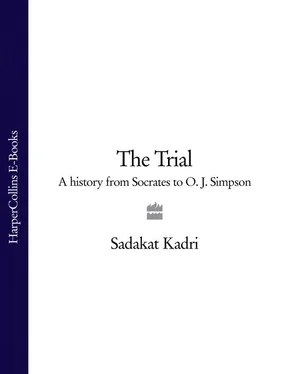The answer to the riddle would be the confession. Admissions have since become so routine a feature of Western criminal justice that it is hard to appreciate just how radical a shift took place during the mid thirteenth century, but the nature of that shift is well illustrated by Louis IX’s laws for southern France. Aware of the deficiencies of the two-witness rule, the king had ordered his judges never to convict on such evidence unless it was backed up by a confession. He was, however, as perturbed by wrongful acquittals as wrongful convictions – and he simultaneously allowed those judges to torture defendants who had aroused suspicion but refused to provide the confession that would be needed to convict them. The law that claimed to protect against unreliable convictions consequently became their primary cause. Within decades the confession was being promoted from a subordinate form of evidence to the regina probationum – ‘the queen of proofs’ – and self-condemnation would soon come to be revered as an almost immaculate guarantor of guilt.
The concept of the regina probationum owed nothing but its Latin to Roman law. It was also alien to the Old Testament – so much so that Maimonides, the foremost Talmudic scholar of the medieval world, declared conviction on the basis of a bare confession to be contrary to divine law. Confessions came to be exalted not because of ancient traditions, but because of seismic changes: a new confidence among political rulers that they could know their subjects’ secrets, and a new morality that was beginning to measure people’s culpability according to the words they uttered.
The tectonic movement occurred on a timescale that is better measured in generations than moments; but if a single occurrence could be identified as pivotal, it would be the Fourth Lateran Council of 1215. In the same set of canons that brought ordeals to an end, Pope Innocent III had commanded that all Catholics annually confess their sins on oath to a priest. The cleric was simultaneously empowered to forgive those who observed the obligation, while those who failed to do so were made liable to excommunication and unhallowed burial. It was a major change. Church thinkers had long agreed that salvation demanded contrition and many had even claimed for the Church a power to forgive sin. No one, however, had ever presumed to suggest that Christians had to verbalize their remorse to be saved – let alone that they had to do so in the presence of a priest.
Innocent’s innovation inspired considerable resistance among ordinary Catholics, and over the next few decades concerted efforts were made to persuade the flock that confession was in their interests. Gregory IX formally advised all doctors to recommend it to their patients, and chroniclers were soon extolling the new sacrament’s benefits. The most influential was a Cistercian monk called Caesarius of Heisterbach whose Dialogue of Miracles , written in the 1220s, would inform popular Christianity for centuries. Four of its twelve chapters were devoted to confessions, and they suggested that their power was prodigious indeed. A popular legend doing the rounds told how St Norbert had exorcized someone of a demon that insisted on revealing the adulteries of everyone around it, but Caesarius now turned the story on its head: he knew of one that had buttoned up simply because the adulterer concerned had confessed. Another fiend had positively lied to protect a girl’s reputation for chastity, so impressed was it by her decision to divulge her sexual history to a priest. Caesarius told of confessions so timely that they had saved vessels from sinking and rendered murderers fireproof even as the flames of their execution pyres were lapping around them. One ancient demon of which he had heard had been so awestruck by the aura of salvation emanating from the confession box that it had insisted on admitting every misdemeanour it had committed since tumbling out of heaven alongside Lucifer. Silence or equivocation, on the other hand, invariably attracted the attentions of less benign apparitions and might even inspire visits from the undead. The message was clear. Blabbing worked wonders, but verbal retention could end in disaster.
There are weighty philosophical arguments to support the belief that expressing responsibilities might lessen them. The insistence on verbalization has always risked robbing speech of its meaning however, and thirteenth-century jurists were soon treating confessions as symbols of guilt rather than methods of establishing facts. The canonical principle that defendants should not be compelled to condemn themselves was watered down to mean only that a forced confession had to be recited in court. It meanwhile became established that torture could be repeated three times. One Dominican inquisitor called Nicolas Eymeric argued in the late fourteenth century that each of the three sessions could itself be ‘continued’ indefinitely. By 1705, one lawyer would be basing his critique of torture on the magnificently metaphysical grounds that justice, like nature, abhorred infinity. Those who managed, despite everything, to hold out, were treated not as innocents but as culprits who had cheated justice, and were typically sent into exile or deprived of an ear on the basis that they deserved punishment for falling under suspicion in the first place. Jean Bouteiller, a jurist of the late 1300s, expressed the prevailing attitude when he advised that a suspect should only ever be released ‘conditionally’ because otherwise ‘it would seem that he had been held prisoner without cause’. His colleagues were evidently of a similar mind. The country’s first trial records, which detail more than a hundred cases from Paris between 1389 and 1392, show an overwhelming majority of defendants confessing and not a single one winning an outright acquittal.
Few trials better capture the shifting meaning of spoken guilt in early modern Europe than the 1440 prosecution of Gilles de Rais. Gilles, born in 1404 as heir to the fortune of three of the wealthiest families of France, enjoyed a youth that seemed charmed indeed for the troubled fifteenth century. At a time when his country was convulsed by a seemingly perpetual war and its nobility torn between those who supported the territorial claims of the English monarchy and the aspirations of the Dauphin, Charles VII, he gambled for high stakes – and won. In May 1429, fighting shoulder to shoulder alongside Joan of Arc, he helped achieve the victory at Orléans that turned the tide of the Hundred Years War. The triumph allowed the French pretender to be crowned at Reims Cathedral, the site of every previous coronation in French history, and his gratitude knew no bounds. Gilles was invited to carry the amphora of anointing oil – no insignificant honour, given that it had supposedly descended to earth on the wings of a heavenly dove – and Charles VII, weeping copiously, concluded the day by appointing him a Marshal of France. At the age of 24, Gilles had reached the top of the tree. The perennial curse of the early achiever is, of course, that all paths from the treetop go down. Even Gilles could hardly have guessed how far he would fall.
Whatever the passions that drove the young hero, they were soon taking him somewhere far from the battlefield. Gilles increasingly neglected his martial duties in favour of the priesthood, and with the war’s end in 1435 he endowed a chapel at his Brittany castle of Machecoul – complete with choir, portable organ, and a chapter of clerics outfitted in fur-lined silk and scarlet – and decided to reenact his most magnificent triumph as theatre in Orléans. It was a glittering train of some two hundred choristers, jugglers, pipers, fire-eaters, and astrologers that now snaked across the countryside – but a shadow was sweeping alongside. For as it moved, children vanished in its wake. Some were last seen taking the hand of rosy-cheeked crones. Others climbed onto strangers’ horses, never to be seen again. And Gilles was enjoying the road show so much that he turned it into a rolling tour.
Читать дальше




![Theresa Cheung - The Dream Dictionary from A to Z [Revised edition] - The Ultimate A–Z to Interpret the Secrets of Your Dreams](/books/692092/theresa-cheung-the-dream-dictionary-from-a-to-z-r-thumb.webp)







